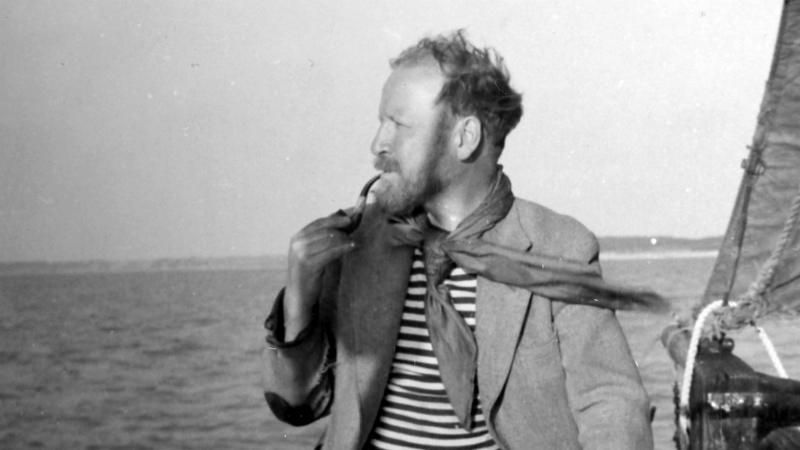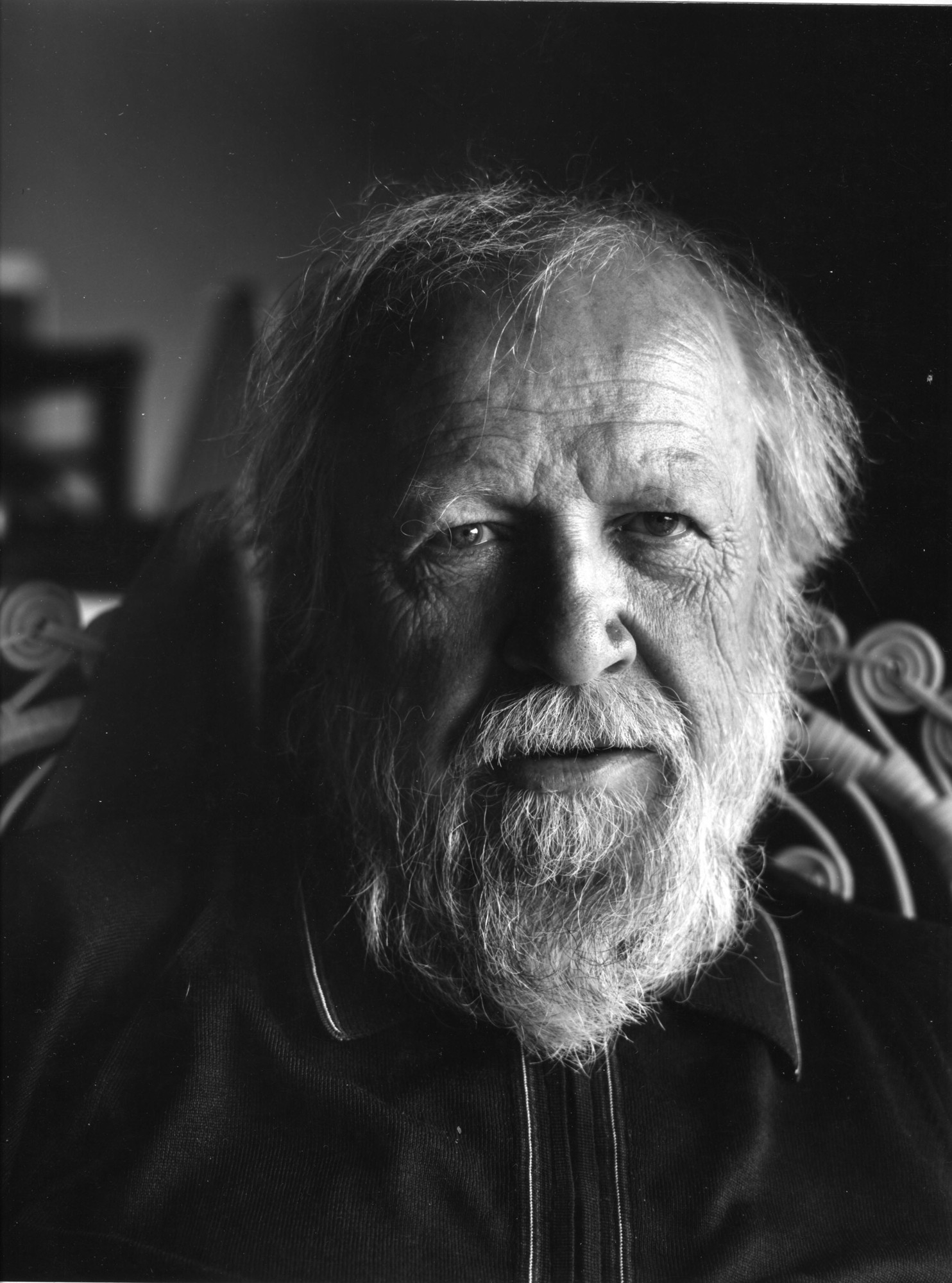Arena: The Dreams of William Golding, BBC Two | reviews, news & interviews
Arena: The Dreams of William Golding, BBC Two
Arena: The Dreams of William Golding, BBC Two
The hopes and fears of an outsider Nobel Laureate

If you’re one of those readers who likes to believe that a novelist’s work and the life he leads have little or nothing to do with one another, then I trust you were watching last night’s Arena: The Dreams of William Golding.
After an upbringing of lower-middle state schooling, immersion in the Classics and archaeology, uncompromising atheism (father) and superstitious eclecticism (mother), eventual Nobel Laureate William Golding was spat out into the world – with a reference from Oxford marked “Not Top Drawer” – chippy, resentful, and deeply susceptible to the wishy-washy of the unconscious. And for the rest of his life, little changed. Bitter about his struggles as a tyro ink-slayer, fatally wounded by his rejections from various publishers (including Faber, who did, eventually, take him on), distrustful of London literary cliques, even stung – quite reasonably – by a leaked dissenting judgement from his Nobel Prize panel, Golding all too often felt that he was on the outside looking in – a habit which, in his case, really didn’t need any extra encouragement.
'The Spire' is basically an extended day-dream written while staring out of the classroom window at Salisbury cathedral
As occasional glimpses of his dream diaries revealed, Golding inhabited a dark place. Wonkily religious, scared of actual darkness, filled with terrible self-loathing and horrified by what he had personally experienced of man’s inhumanity to man, Golding was perhaps a natural fantasist (it’s not beyond possible that he thought his mentally troubled son David was a punishment from God). He spoke of a “dream ego”, and he had a recurrent nightmare of being hanged, sometimes with his father looking on.
But The Dreams of William Golding wasn’t really about his dreams, of course. With an imagination bordering on the visionary, he saw our wicked thoughts – what we might do – as fertile territory for books, and those books in some sense as prophylactic measures. Sleeping and waking, he seemed to live what would turn out to be his source material: “I am in a state of confusion between the imaginative world and the real world.” He literally (not to say “literarily”) lost himself, on occasion.
With a little steering from family members, former pupils, fellow writers, philosopher John Gray and biographer John Carey (author of an excellently compelling Golding tome a couple of years back), Arena’s application of, for example, WWII footage over readings from Lord of the Flies was effective in re-blending Golding’s output with his various inputs.
Golding was an ideas man: schoolboys gone savage, conflict between early forms of man, the building of a spire to God, a sailor marooned on a rock. He was especially drawn to scenarios of a lone protagonist trapped in an environment against which he had to fight. He thought of himself, legitimately enough, as a sort of renegade scholar, and neither bowed to literary fashions nor shied away from a challenge. The Inheritors, about the decline of homo erectus, is a book with no developed language to describe things. Pincher Martin has a hero who dies on page two, and then spends the rest of his life(-story) in purgatory – without knowing it. Big themes occupied Golding’s mind, original sin being perhaps top of the list. Fascinated and horrified in equal parts by the “fragility of goodness”, Golding explored these focal human dilemmas in what were essentially modern myths. A natural precursor to the likes of JG Ballard, he was, at heart, a social anthropologist in narrative guise (a “novelist”, if you like).
Unlike most anthropologists, though, the English tutor Golding took his theories into the classroom to test. He decided, one chaotic Golding family bath-time, to write a book about what really might happen if children were unleashed in their natural state. Nigel Williams says, “It’s absolutely crucial to Lord of the Flies that it couldn’t have been written by somebody who wasn’t a schoolmaster.” The result, of course, was legendary, made Golding rich, and continues to foist its relevance on generations of schoolchildren today. The film showed footage of contemporary British pupils being encouraged to consider Lord of the Flies in the context of last year’s Tottenham riots.
It is a shame, in the circumstances, that the aspiring novelist known as “Scruff” by his pupils is recollected as having rather lost interest in teaching by the time Lord of the Flies was published. One boy remembers being made to count the words on draft pages of The Inheritors. And Golding’s fifth novel, The Spire, is basically an extended day-dream written while staring out of the classroom window at Salisbury cathedral.
 Domestic life with Golding wasn’t a breeze, either. In a wonderful segment, Mrs Golding (Anne) describes the typical fallout when she is asked for her notes on his works-in-progress (Golding, in shot, says nothing); his complicated view of pretty much everything predictably enough spilled over into a romantic involvement – if not actually an affair - with an American graduate student who was studying his work (“besotted”, she modestly calls him; she now a professor at Rutgers University). And the Golding’s son David had a mental breakdown while at university, from which he never quite recovered. The role of the saturnine father here was barely touched on.
Domestic life with Golding wasn’t a breeze, either. In a wonderful segment, Mrs Golding (Anne) describes the typical fallout when she is asked for her notes on his works-in-progress (Golding, in shot, says nothing); his complicated view of pretty much everything predictably enough spilled over into a romantic involvement – if not actually an affair - with an American graduate student who was studying his work (“besotted”, she modestly calls him; she now a professor at Rutgers University). And the Golding’s son David had a mental breakdown while at university, from which he never quite recovered. The role of the saturnine father here was barely touched on.
Frequently of the view that life was almost just an imagining of itself (cue footage of Melvyn Bragg watching footage of Melvyn Bragg interviewing William Golding), it is eerie that Golding’s book The Spire, about the fanatical construction of an edifice (at great personal and social cost) was written just as Golding turned pro, and embarked on the fanatical construction of an edifice… An edifice which, with wondrous, almost mythical predictability, promptly collapsed.
Having achieved fame, and then been hit with a couple of bad reviews (of The Spire, indeed), Golding didn’t produce anything between 1967 and 1977. He had too much time on his hands, no schedule, and free access to booze. He got drunk, lost patience, was occasionally violent to Anne. In a late novel, Darkness Visible, he tried to work out his terrible depressions and frustrations regarding David through the spirit-dealing wunderkind character of Matty. “A kind of homage to David,” Carey calls it. A homage, and perhaps a correction. There is always a “There but for the grace…” quality to Golding’s novels (if one is being optimistic), and Golding’s pensive and cautious daughter Judy concludes that David, in his instability, was simply William gone that one step too far.
By the time he wrote the last of his bestselling To the Ends of the Earth trilogy, Golding had a Nobel, the Booker Prize, money and fame. But he was still writing about a man of troubled faith, stuck on a ship, about class, about myth, the border between reality and unreality, sexual discovery and perversion, battling against nature, about isolation…
Share this article
The future of Arts Journalism
You can stop theartsdesk.com closing!
We urgently need financing to survive. Our fundraising drive has thus far raised £49,000 but we need to reach £100,000 or we will be forced to close. Please contribute here: https://gofund.me/c3f6033d
And if you can forward this information to anyone who might assist, we’d be grateful.

Subscribe to theartsdesk.com
Thank you for continuing to read our work on theartsdesk.com. For unlimited access to every article in its entirety, including our archive of more than 15,000 pieces, we're asking for £5 per month or £40 per year. We feel it's a very good deal, and hope you do too.
To take a subscription now simply click here.
And if you're looking for that extra gift for a friend or family member, why not treat them to a theartsdesk.com gift subscription?
more TV
 Murder Before Evensong, Acorn TV review - death comes to the picturesque village of Champton
The Rev Richard Coles's sleuthing cleric hits the screen
Murder Before Evensong, Acorn TV review - death comes to the picturesque village of Champton
The Rev Richard Coles's sleuthing cleric hits the screen
 Black Rabbit, Netflix review - grime and punishment in New York City
Jude Law and Jason Bateman tread the thin line between love and hate
Black Rabbit, Netflix review - grime and punishment in New York City
Jude Law and Jason Bateman tread the thin line between love and hate
 The Hack, ITV review - plodding anatomy of twin UK scandals
Jack Thorne's skill can't disguise the bagginess of his double-headed material
The Hack, ITV review - plodding anatomy of twin UK scandals
Jack Thorne's skill can't disguise the bagginess of his double-headed material
 Slow Horses, Series 5, Apple TV+ review - terror, trauma and impeccable comic timing
Jackson Lamb's band of MI5 misfits continues to fascinate and amuse
Slow Horses, Series 5, Apple TV+ review - terror, trauma and impeccable comic timing
Jackson Lamb's band of MI5 misfits continues to fascinate and amuse
 Coldwater, ITV1 review - horror and black comedy in the Highlands
Superb cast lights up David Ireland's cunning thriller
Coldwater, ITV1 review - horror and black comedy in the Highlands
Superb cast lights up David Ireland's cunning thriller
 Blu-ray: The Sweeney - Series One
Influential and entertaining 1970s police drama, handsomely restored
Blu-ray: The Sweeney - Series One
Influential and entertaining 1970s police drama, handsomely restored
 I Fought the Law, ITVX review - how an 800-year-old law was challenged and changed
Sheridan Smith's raw performance dominates ITV's new docudrama about injustice
I Fought the Law, ITVX review - how an 800-year-old law was challenged and changed
Sheridan Smith's raw performance dominates ITV's new docudrama about injustice
 The Paper, Sky Max review - a spinoff of the US Office worth waiting 20 years for
Perfectly judged recycling of the original's key elements, with a star turn at its heart
The Paper, Sky Max review - a spinoff of the US Office worth waiting 20 years for
Perfectly judged recycling of the original's key elements, with a star turn at its heart
 The Guest, BBC One review - be careful what you wish for
A terrific Eve Myles stars in addictive Welsh mystery
The Guest, BBC One review - be careful what you wish for
A terrific Eve Myles stars in addictive Welsh mystery
 theartsdesk Q&A: Suranne Jones on 'Hostage', power pants and politics
The star and producer talks about taking on the role of Prime Minister, wearing high heels and living in the public eye
theartsdesk Q&A: Suranne Jones on 'Hostage', power pants and politics
The star and producer talks about taking on the role of Prime Minister, wearing high heels and living in the public eye
 King & Conqueror, BBC One review - not many kicks in 1066
Turgid medieval drama leaves viewers in the dark
King & Conqueror, BBC One review - not many kicks in 1066
Turgid medieval drama leaves viewers in the dark
 Hostage, Netflix review - entente not-too-cordiale
Suranne Jones and Julie Delpy cross swords in confused political drama
Hostage, Netflix review - entente not-too-cordiale
Suranne Jones and Julie Delpy cross swords in confused political drama

Add comment